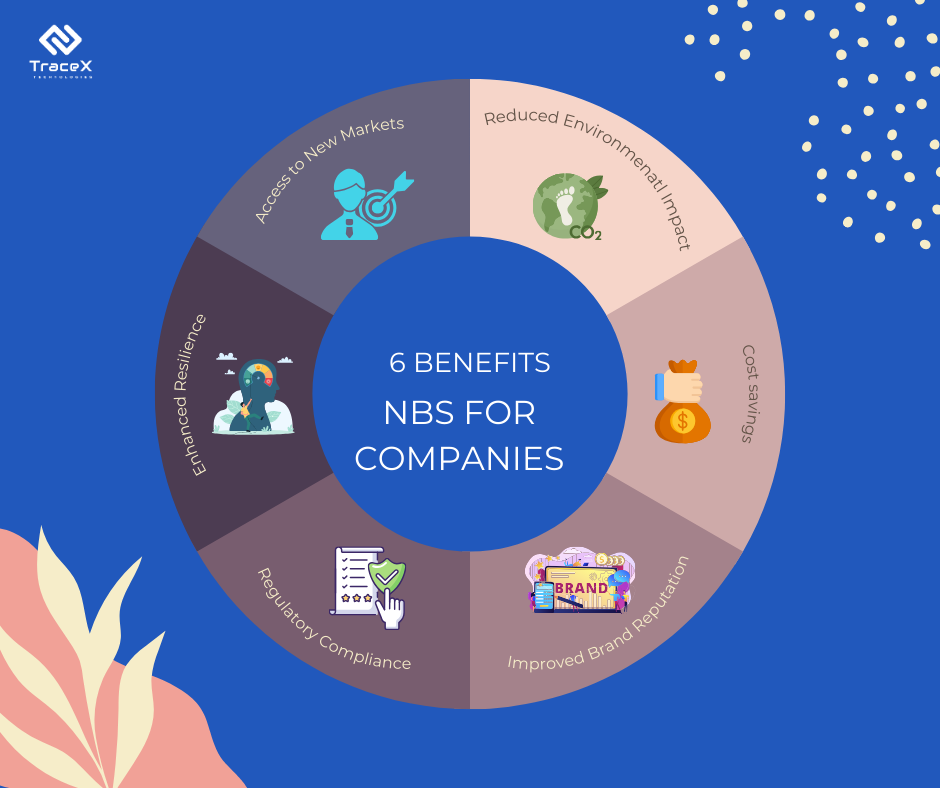Contact: +91 99725 24322 |
Menu
Menu
Quick summary: Explore how companies can harness the potential of Nature-Based Solutions for a revolutionary transformation in the food system. Uncover strategies and insights for a sustainable and resilient future.

In an era marked by mounting concerns over climate change, biodiversity loss and sustainability of our global food systems, the role of companies in driving positive change has never been more vital. As we confront a triple planetary crisis, one that encompasses climate change, nature loss and pollution, the imperative for sustainable and resilient food production becomes increasingly clear. Nature-based solutions emerge as a potent ally, offering a pathway towards addressing societal and environmental challenges while promoting the well-being of both humanity and biodiversity.
A recent study by scientists at the University of Oxford found that 99.99% of current CO2 removals come from nature and land management.
This blog delves into the important role that companies can play in leveraging nature-based solutions for transformation of our food systems. We will explore what NBS is and why companies are uniquely positioned to drive their adoption and the benefits this initiative can yield. Companies need to be inspired and take action to be a part of the solution. Join us as we unravel the powerful potential of nature-based solutions in reshaping the future of food.
Nature-based solutions represent an innovative approach to addressing pressing societal and environmental challenges, particularly in the context of transforming our food systems. At its core, NBS harnesses the power of nature, focusing on protection, sustainable management and restoration of natural or modified ecosystems to tackle issues such as climate change, biodiversity loss and sustainable food production.
Companies within the food sector wield significant influence due to their scale of operations, global supply chains and consumer reach. They possess the resources and capacity for innovation necessary to drive positive change. They can invest in research, technology and sustainable practices, catalysing advancements in industry. Today consumers are eco-conscious and demand sustainable products. Companies that promote sustainability not only meet consumer expectations but also gain a competitive edge. Companies that proactively embrace sustainable practices are better positioned for compliance and adaptation. Sustainability efforts can reduce exposure to environmental and reputational risks. Companies that incorporate NBS into their operations enhance resilience against climate related disruptions. By collaborating with suppliers, companies can drive sustainable practices throughout the supply chain, fostering responsible sourcing, waste reduction and ethical labour practices.
Companies hold a unique position of influence and responsibility in advancing sustainability within the food industry. Their engagement with NBS can lead to transformative changes in agriculture practices, environmental stewardship and overall sustainability of our food systems.
Nature-based solutions are innovative strategies that leverage the inherent capabilities of natural ecosystems to address pressing environmental and societal challenges. These solutions focus on sustainable management, protection and restoration of ecosystems enabling them to provide a wide range of benefits from mitigating climate change and conserving biodiversity to enhancing human well-being.
NBS involves restoring degraded ecosystems to their natural state. This includes activities like reforestation, wetland rehabilitation and coral reef restoration. These efforts not only bring back lost biodiversity but also improve ecosystem services.
Sustainable practices like agroforestry, regenerative agriculture and rotational grazing can be integrated into land use. This ensures that ecosystems continue to provide essential services while accommodating human activities.
Conserving natural areas like protected parks and wildlife reserves is crucial to NBS. This safeguards biodiversity and protects ecosystem health.
The triple planetary crisis cannot be solved in isolation as they are interconnected and demand urgent attention. Let us see how companies can address these 3 challenges:
Challenge- Climate change poses a severe threat to the food industry. Rising global temperatures can disrupt weather patterns leading to increased pests and diseases impacting crop yields and food production.
Solution- Companies have a significant carbon footprint due to their operations, supply chains and distribution networks. They can lead by example in reducing greenhouse gas emissions, through sustainable practices, renewable energy adoption and emission reduction initiatives.
Challenge- Deforestation and habitat degradation contributes to decline of essential pollinators, disrupts ecosystems and threatens food security. Loss of biodiversity affects crop pollination and genetic diversity, making food systems vulnerable.
Solutions- Companies can source sustainably and promote land use practices within their supply chains. Supporting reforestation efforts and reducing habitat destruction are key steps towards mitigating this challenge.
Challenge- Pollution from agriculture practices like pesticide and fertilizer run off affects water quality and marine ecosystems. Plastic pollution associated with packaging also harms marine life and ecosystems.
Solutions- Companies can adopt eco-friendly packaging, reduce plastic use and implement clean agriculture practices. Reducing the pollution in their operations and supply chains contributes to cleaner ecosystems.
Global Food Supply
As the global population approaches 11 billion by 2100, the demand for food is surging. Concurrently the consumption of carbon-intensive foods, especially red meat is rising with increasing incomes in emerging economies. To combat this, substantial transformations are essential to reduce GHG emissions per unit food of food and minimize food loss throughout the supply chain. Shifting towards plant-rich diets from emission intensive foods holds the potential to align emissions with a scenario having a 50 % chance of limiting global temperature rise to 1.5˚C Nature-Based Solutions
In the F&B sector, the adoption of nature-based solutions is pivotal in the quest for mitigating emissions. NBS aims at safeguarding, restoring or enhancing the management of natural or working lands. These solutions not only reduce greenhouse gas emissions, prevention of land conversion and reduction of non-CO2 emissions but also bolster carbon removal from the land.
While many industries resort to purchasing carbon credits from NBS to offset emissions, the food and beverage sector faces emissions primarily rooted in land-based processes such as deforestation and agricultural production. NBS emerges as a legitimate approach to address these Scope 3 emissions effectively.
To promote sustainability and combat climate change, investors are encouraged to push F&B companies towards financing or implementing carbon removal solutions within their value chains. These solutions include practices like afforestation, forest restoration, agroforestry and regenerative agriculture. Preserving existing forests, yields far reaching benefits for the climate, biodiversity and local communities, surpassing the value of replanting trees in the future.
Preserving biodiversity is an indispensable component of global food systems and the intricate supply chains interconnected with agricultural commodities. When contemplating land-based climate interventions, companies should prioritize actions that not only minimize potential harm but also maximize the potential benefits of biodiversity. Agroforestry practices not only fosters biodiversity but also reduces a company’s overall greenhouse gas emissions.
The current environmental challenges faced by the food industry are formidable, but companies possess the capacity to effect change. Their influence in supply chains, combined with the ability to innovate and respond to consumer demands, positions them as change agents in the journey towards a sustainable and resilient food system. By embracing sustainable practices, companies can lead the way in mitigating climate change, preserve nature and biodiversity, while ensuring a secure future for all.

Several companies have successfully integrated NBS into their operations.
Unilever encourages sustainable farming practices among its suppliers. By promoting responsible land use and reducing deforestation, Unilever not only minimizes its environmental impact but also ensures a more secure supply of agriculture raw materials.
Nestle is another prominent example of a company actively engaging in sustainability efforts, including the adoption of nature-based solutions to reduce its environmental impact and enhance its corporate social responsibility.
Danone the F&B giant is committed to regenerative agriculture focusing on soil health and carbon sequestration. By investing in soil health initiatives, Danone aims to reduce its greenhouse gas emissions, while fostering sustainable farming practices among its dairy farmers.
Traceable supply chains- Implement blockchain traceability solutions to track the origin and journey of food products.
Responsible Sourcing- Prioritize suppliers who adhere to sustainable and ethical practices. Engage in responsible sourcing of deforestation prone commodities.
Certifications- Seek and promote certifications like Fair Trade, rainforest Alliance or organic certification to ensure responsible sourcing and adherence to environmental and social standards.
Soil health- Implement regenerative agriculture practices like cover cropping, reduced tillage and crop rotation to improve soil health and carbon sequestration.
Agroforestry- Integrate agroforestry into farming systems to increase biodiversity, sequester carbon and provide additional sources of income.
Biodiversity Conservation- Encourage presence of pollinators and natural predators to reduce the need for chemical pesticides.
Community Engagement- Collaborate with local communities to develop and implement NBS initiatives.
Capacity Building- Invest in capacity building programs that empower local communities to actively participate in NBS projects.
Economic Inclusion- Ensure that NBS initiatives create economic opportunities for local communities.
Trace Carbon empowers companies to plan, implement and monitor sustainability and NBS strategies effectively. It offers real-time data collection, reporting and analytics, enabling companies to make informed decisions, engage stakeholders and track progress towards their sustainability goals. By leveraging TraceX solutions, companies can navigate the challenges of adopting NBS with confidence and achieve their sustainability objectives. Conclusion
In conclusion, the adoption of nature-based solutions represents a opportunity for companies to lead the change in transforming our food systems for amore sustainable and resilient future. By integrating NBS into their core strategies, supply chains and operations, companies can reduce their environmental footprint, drive cost efficiencies, enhance brand reputation and contribute to global climate and biodiversity goals.
Companies that leverage NBS not only safeguard their own future but also play a vital role in nourishing a growing global population while protecting the planet.
